Eerdmans Catholic Thought Collection (12 vols.)
Digital Verbum Edition
Overview
The Eerdmans Catholic Thought Collection presents a wealth of insights, reflections, and challenges for Catholics, and indeed, all Christians. This is not a collection for soothing re-affirmation of the modern-day “it’s all good” mentality, but rather a powerful set of volumes that provoke you to re-think what it means to be Christian. Read the autobiography of controversial archbishop Rembert Weakland. Examine a challenge to the concept of papal infallibility. Hear two different approaches to the beloved twentieth-century theologian Hans Urs von Balthasar. Non-violence. Salvation. The new evangelization. You’ll encounter all this and more in this collection.
In the Logos editions, these volumes are enhanced by amazing functionality. Scripture citations link directly to English translations, and important terms link to dictionaries, encyclopedias, and a wealth of other resources in your digital library. Perform powerful searches to find exactly what you’re looking for. Take the discussion with you using tablet and mobile apps. With Logos Bible Software, the most efficient and comprehensive research tools are in one place, so you get the most out of your study.
Want an even better deal? Get more books at a bigger discount when you order the Eerdmans Bible Reference Bundle 2!
Take a look at the Journal of Moral Theology (4 issues).
Key Features
- Offers a challenging look at Catholic thought and what it means in today’s culture
- Presents insights on the new evangelization
- Examines the work of theologians like Hans Urs von Balthasar and David L. Schindler
Product Details
- Title: Eerdmans Catholic Thought Collection
- Publisher: Eerdmans
- Volumes: 12
- Pages: 4,060
- Christian Group: Catholic
- Resource Type: Topical
- Topic: Roman Catholicism
Individual Titles
- A Pilgrim in a Pilgrim Church: Memoirs of a Catholic Archbishop by Rembert G. Weakland
- Papal Infallibility: A Protestant Evaluation of an Ecumenical Issue by Mark E. Powell
- Put down Your Sword: Answering the Gospel Call to Creative Nonviolence by John Dear
- Gathered for the Journey: Moral Theology in Catholic Perspective by David Matzko McCarthy and M. Therese Lysaught
- Light in Darkness: Hans Urs von Balthasar and the Catholic Doctrine of Christ’s Descent into Hell by Alyssa Lyra Pitstick
- To Follow You, Light of Life: Spiritual Exercises Preached before John Paul II at the Vatican by P. David Glenday and Bruno Forte
- Nature as Reason: A Thomistic Theory of the Natural Law by Jean Porter
- Heart of the World, Center of the Church by David L. Schindler
- Ordering Love: Liberal Societies and the Memory of God by David L. Schindler
- Being Holy in the World: Theology and Culture in the Thought of David L. Schindler by Nicholas J. Healy Jr. and D.C. Schindler
- The Worship of God: Some Theological, Pastoral, and Practical Reflections by Ralph P. Martin
- Will Many Be Saved? by Ralph Martin
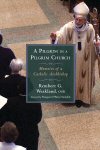
For many people, the name of Archbishop Rembert Weakland brings to mind only connotations of scandal—the titillating tale of a prominent priest disgraced. But that whiff of dishonor barely begins to tell the whole story.
In these pages Weakland recounts his life from his childhood in rural Pennsylvania to his retirement from the archbishopric in 2002 at the age of 75, all in the context of the Church that he long served. Weakland takes readers with him to Rome, where he discovered the splendor of a whole new intellectual world, and then to New York for his extensive musical study at Julliard and Columbia University. From his early days in the priesthood to his struggles with pontiffs, Weakland details how he learned to become a leader and minister to his people and how his famously liberal beliefs affected his ministry. While he presents an honest account of the scandal he is so often recognized for, the complete picture beyond rumor and accusation may come as a surprise to many readers.
Throughout his book Weakland describes with poignant honesty his psychological, spiritual, and sexual growth. Evocative and inspiring, A Pilgrim in a Pilgrim Church tells the story of a life fully lived.
This book was named Catholic Press Association’s First Place Biography in 2010.
An invaluable historical record and a moving personal confession.
—Publishers Weekly
Rembert G. Weakland, OSB, was elected archabbot of St. Vincent Monastery in Latrobe, Pennsylvania, in 1963, and abbot primate of the International Benedictine Confederation in 1967, and he served as archbishop of Milwaukee from 1977 to 2002. He is the author of many articles on medieval music and of frequently cited articles on religious subjects.
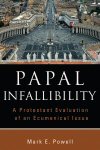
The dogma of papal infallibility has become increasingly problematic for Roman Catholics, and it is a major point of division in Christian ecumenical dialogue—arguably the key issue separating Catholics and other Christians today. Mark Powell here contends that papal infallibility has inevitable shortcomings as a way to secure religious certainty. After introducing the doctrine, he illustrates those limitations in the life and writings of four prominent Catholic theologians: Henry Edward Cardinal Manning, John Henry Cardinal Newman, Avery Cardinal Dulles, and Hans Kung.
The book concludes with a fresh proposal for conceiving religious epistemology, ecclesial authority, and ecumenical agreement. Powell’s Papal Infallibility is an accessible, critical study for Catholics and non-Catholics alike.
This is the first major book-length study on this subject written by a Protestant in more than a century.
A Protestant theologian strongly committed to ecumenical Christian understanding, Mark Powell offers here a perceptive critical review of the Catholic doctrine of papal infallibility, by studying in depth the approaches taken to it by four major Catholic thinkers of the nineteenth and twentieth centuries. His treatment is clear, lively, and fair-minded, and it should be welcomed by both Catholics and Protestants as a careful and constructive contribution to contemporary discussions of religious epistemology.
—Brian Daley, Catherine F. Huisking Professor of Theology, University of Notre Dame
It has been a long time since a Protestant theologian in the English-speaking world took up the topic of papal infallibility and gave it the kind of serious attention it deserves. Papal infallibility is intrinsically interesting and has been a critical ecumenical issue over the last century. Mark Powell rightly locates the doctrine of papal infallibility within the epistemology of theology before providing a sensitive overview of the various ways in which it has been conceived and elaborated. Throughout this work, Powell is sensitive, accurate, and irenic. His own substantial evaluations and final conclusions are carefully stated and defended. The result is a splendid book—indispensable reading for all future treatments of this topic.
—William J. Abraham, Albert Cook Outler Professor of Wesley Studies, Southern Methodist University
Mark Powell’s lucid and insightful study makes an important contribution to current discussions of religious epistemology and ecumenical dialogue on religious authority. In bringing the insights of canonical theism to bear on the Roman Catholic doctrine of papal infallibility, Powell highlights the essentially epistemic function of this teaching and shows its weaknesses in fulfilling this role. But this work is not just for Roman Catholics. Protestants too have quested futilely for certainty of knowledge and indisputability of interpretation. Powell’s criticisms of Catholic efforts to bypass these problems apply equally to Protestant strategies. And his constructive proposal for discerning and maintaining Christian identity—that is, canonical theism—pertains to Protestants as much as to Roman Catholics. This book begs to be followed by a study of how an infallible and perspicuous scripture functions in Protestant theology.
—Ron Highfield, professor of religion, Pepperdine University
In recent years, many Protestant theologians have made their way from Protestant denominations to the Roman Catholic Church. While there are various motives for this move, among them is surely a growing frustration with the hermeneutical and theological chaos now rampant within Protestantism. Over against this chaos is the promise of doctrinal unity and stability secured by an authoritative teaching office known as the magisterium. However, within Catholicism itself, the magisterium raises as many questions as it answers. In a thorough and lively examination of the doctrine of papal infallibility, Mark Powell brings these questions into the full light of day. For Protestants disillusioned with sola scriptura, this volume offers a probing and sobering account of an alternative solution to the problems of doctrinal disunity and instability in Western Christianity.
—Jason E. Vickers, professor of theology and Wesleyan studies, United Theological Seminary
Mark E. Powell is associate professor of theology at Harding University Graduate School of Religion in Memphis, Tennessee. He is also a contributor to Canonical Theism: A Proposal for Theology and the Church.
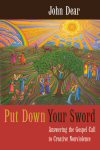
Few books on the market share not only a vision of Jesus’ nonviolence but also ways of actually living out that same vision today. Who better to write such a work than Father John Dear, an internationally known peacemaker?
Put down Your Sword invites us into Jesus’ way of nonviolence as presented by the Gospels. Arguing that all Christians must follow Christ’s example in the ways of peace, Dear outlines the many actions he himself has taken following the path of nonviolence, modeling his own vision of peace in this turbulent world.
First sharing his convictions and insights about the nonviolence of Jesus, the Beatitudes, the nature of God, and the mystery of the resurrection, Dear goes on to relate stories from the various protests in which he has been involved. Journal entries from missions to India and Colombia offer a poignant backdrop for his impassioned argument. Dear also profiles the peacemakers he finds most inspiring, from Martin Luther King Jr. to Henri Nouwen to Joan Baez. Finally, he reflects on care for the earth, the teachings of Thomas Merton, and the vision of a new world without war, poverty, or violence.
Some teachers are all theory and some are all practice. John Dear has the ability to be both. Some teachers are very orthodox and some open new ground. John Dear puts the two together knowing they are the same.
—Richard Rohr, author, The Naked Now: Learning to See as the Mystics See
John Dear not only talks about Jesus but also lives Jesus—radical, loving, nonviolent Jesus. He prisms Jesus through his own life and brings us into the adventure.
—Sister Helen Prejean, author, Dead Man Walking
For evil to prevail requires only that good people sit on the sidelines and do nothing. Fr. John Dear is compelling all of us to stand up and take responsibility for the suffering of humanity so often caused through selfishness and greed.
—Desmond Tutu, archbishop emeritus, Cape Town, South Africa
Dear has the gift to capture the social gospel as Jesus and the apostles proclaimed it. His writing is in the tradition of Thomas Merton, Henri Nouwen, Jean Vanier, and Daniel Berrigan.
—J. Christoph Arnold, founder, Breaking the Cycle
John Dear is an internationally recognized voice for peace and nonviolence. Priest, pastor, peacemaker, retreat leader, and author, he served for years as the director of the Fellowship of Reconciliation. His many books include You Will Be My Witnesses, Living Peace, Jesus the Rebel, and Disarming the Heart.
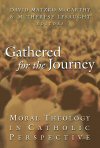
Gathered for the Journey sets moral reasoning in a theological context of worship and discipleship, provides a framework for the moral life based on questions of human fulfillment, and demonstrates how these theological resources shape a distinctive approach to questions of globalization, Catholic social teaching, the family, war and peace, bioethics, and the environment.
McCarthy and Lysaught have crafted a distinctively unified collection. Gathered for the Journey represents a common project among Catholic scholars who are struggling with similar questions about living faithfully.
Contributors
- Frederick Christian Bauerschmidt
- William T. Cavanaugh
- David M. Cloutier
- Dana Dillon
- James M. Donohue
- Jeanne Heffernan Schindler
- Kelly S. Johnson
- M. Therese Lysaught
- William C. Mattison III
- David M. McCarthy
- Michael R. Miller
- Julie Hanlon Rubio
- Tobias Winright
This book was awarded Third Place in Catholic Press Association’s Theology category in 2008.
The Second Vatican Council spoke of the need for a Christ-centered, innovative, nonlegalistic approach to moral theology. This volume fulfills that need. Composed by a group of young Catholic scholars, it presents ‘the good life’ in light of Christ’s teaching and traditional theological concepts. After considering foundational concepts in a realistic perspective, it applies these concepts to various aspects of daily life, such as life in community, consumerism, family life, war and peace, and bioethics. Remarkably unified in content and purpose, Gathered for the Journey will serve well as a comprehensive textbook for college students, or as a reference work for anyone interested in learning more about friendship with God. As a moral theologian nearing the end of his career, my overwhelming reaction to this presentation is hope for the future of Catholic moral science.
—Kevin O’Rourke, OP, lecturer, Neiswanger Institute, Loyola University Chicago
This collection offers the important voices of emerging young scholars who bring fresh perspectives on a traditional discipline. They show that ‘moral theology’ is as much about a way of life as about analysis of problems. Readers of Gathered for the Journey will see what it takes to energize Catholic teaching for a new generation. The originality of the contributions makes them essential reading for the scholar; their timeliness and practicality match them perfectly to classroom use.
—Lisa Sowle Cahill, J. Donald Monan Professor, Boston College
David Matzko McCarthy is Fr. James M. Forker Professor of Catholic Social Teaching at Mount St. Mary’s University in Emmitsburg, Maryland. He is the author or editor of several books, including The Good Life: Genuine Christianity for the Middle Class, Sex and Love in the Home: A Theology of the Household, and Gathered for the Journey: Moral Theology in Catholic Perspective.
M. Therese Lysaught is associate professor and director of graduate studies in theology at Marquette University in Milwaukee, Wisconsin.
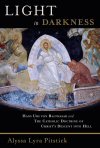
“He descended into hell.”
Hans Urs von Balthasar, one of the most influential theologians of the twentieth century, placed this affirmation of the Nicene Creed at the heart of his reflection on the world-altering events of Holy Week, asserting that this identification of God with the human experience is at the “absolute center” of the Christian faith. Yet is such a descent to suffering really the essence of Catholic belief about the mystery of Holy Saturday?
Alyssa Lyra Pitstick’s Light in Darkness—the first comprehensive treatment of Balthasar’s theology of Holy Saturday—draws on the multiple yet unified resources of authoritative Catholic teaching on Christ’s descent to challenge Balthasar’s conclusions. Pitstick conducts a thorough investigation of Balthasar’s position that Christ suffered in his descent into hell and asks whether that is compatible with traditional teaching about Christ.
Light in Darkness is a thorough argument for the existence and authority of a traditional Catholic doctrine of Christ’s descent as manifested in creeds, statements of popes and councils, Scripture, and art from Eastern and Western traditions. Pitstick’s carefully argued, contrarian work is sure to spur debate across the theological spectrum.
Pitstick’s book is a challenge to those who regard Balthasar as an entirely trustworthy theologian, ranking with the greatest masters of the Tradition. She subjects his understanding of Christ’s descent into hell to a searching critique and shows it to be seriously at odds with the teaching of the fathers and Doctors of the Church.
—John Saward, associate lecturer, Blackfriars, Oxford University
This severe, but forcefully argued, study will have to be borne in mind in all future assessment of Balthasar’s theological doctrine.
—Aidan Nichols, John Paul II Memorial Visiting Lecturer, Oxford University
Alyssa Pitstick gives no quarter. She notes instances in which Balthasar, in her view, misrepresents scriptural, patristic, and magisterial texts and simply ignores aspects of the tradition inconvenient to his argument. . . Pitstick has thrown down a gauntlet that other theologians should not ignore. . . . Thanks to Pitstick, a new and lively debate over Balthasar’s achievement is almost certainly under way.
—Richard John Neuhaus, First Things
An impressive book. Pitstick has had the courage to challenge a major theological reputation head on, and has done so with great skill. The result is the most sustained and detailed criticism of Balthasar’s theology yet published in English, and a work of acute argument in its own right.
—New Blackfriars
Alyssa Lyra Pitstick holds degrees from Pontifical University in Rome, International Theological Institute in Austria, and Gonzaga University, and is assistant professor of religion at Hope College in Holland, Michigan.
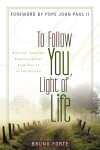
A little more than a year before his death, Pope John Paul II gathered his closest aides for an extended retreat at the Vatican. During this retreat Bruno Forte offered a series of meditations revolving around Jesus’ words in John 8:12: “Whoever follows me will never walk in darkness but will have the light of life.”
Now translated by David Glenday and collected in this lovely book, these meditations draw us into the life, death, and resurrection of Jesus and orient us toward the mission of the Church. A master of thoughtful questioning, Forte shepherds his readers through the classic Ignatian spiritual exercises: a day of purification, a day of illumination, and three days of reflection on Easter, the church, and mission.
Each day includes four meditations, two reflecting on the day’s theme followed by two careful considerations of scriptural texts. Forte concludes his meditations with questions that provoke deeper reflection on our own faith journeys.
Thoughtful, insightful, and nurturing, Forte’s book has much wisdom to offer all Christians who desire to follow more closely the “Light of life.”
This book includes a forward by Pope John Paul II.
This book was awarded Second Place in Catholic Press Association’s Spirituality category in 2006.
Bruno Forte is archbishop of Chieti-Vasto, Italy. He has also served as professor of systematic theology at the Pontifical Theological Faculty of Naples, Italy, as a member of the International Theological Commission of the Holy See, and as a consultant of the Pontifical Council for Culture.
P. David Glenday is also translator of The Portal of Beauty and The Essence of Christianity with Bruno Forte.
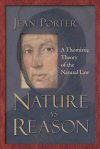
This noteworthy book develops a new theory of the natural law that takes its orientation from the account of the natural law developed by Thomas Aquinas, as interpreted and supplemented in the context of scholastic theology in the twelfth and thirteenth centuries.
Though this history might seem irrelevant to twenty-first-century life, Jean Porter shows that the scholastic approach to the natural law still has much to contribute to the contemporary discussion of Christian ethics. Aquinas and his interlocutors provide a way of thinking about the natural law that is distinctively theological while at the same time remaining open to other intellectual perspectives, including those of science.
In the course of her work, Porter examines the scholastics’ assumptions and beliefs about nature, Aquinas’ account of happiness, and the overarching claim that reason can generate moral norms. Ultimately, Porter argues that a Thomistic theory of the natural law is well suited to provide a starting point for developing a more nuanced account of the relationship between specific beliefs and practices. While Aquinas’ approach to the natural law may not provide a system of ethical norms that is both universally compelling and detailed enough to be practical, it does offer something that is arguably more valuable—namely, a way of reflecting theologically on the phenomenon of human morality.
After a decade of provocative publications, Jean Porter has marshaled her arguments into a cohesive natural law theory that addresses the concerns and biases marking the twenty-first century. With a nod to both medieval scholasticism and the present-day natural sciences, Porter presents her theory as providing a theological foundation and framework for understanding morality, the virtues, ethical norms, moral progress, and happiness. Along the way she engages the relevant works of philosophers and theologians, both Catholic and Protestant. With a clear, amiable voice she maps out where she stands in the assembly of her colleagues. In doing so, she takes on a bit of the persona of Thomas Aquinas, who, while offering his own proposals, always anticipated the response of his own contemporaries. Porter’s own Summa on the natural law is mature, comprehensive scholarship at its best.
—James F. Keenan, SJ, The Founders Professorship in Theology, Boston College
The theology that emerges from Porter’s work is that rare mixture of robust doctrine and generosity and toleration grounded on that robustness. . . .This is a book of the highest rank, both in scholarly and intellectual terms.
—The Times Literary Supplement
A clearly written, tightly argued constructive work of theological ethics which makes a genuine contribution to the natural law tradition, extending it in theologically fruitful ways.
—Reviews in Religion & Theology
Jean Porter is John A. O’Brien Professor of Theology at the University of Notre Dame. Her books include Natural and Divine Law and Nature as Reason.
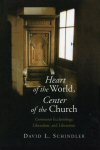
Today, 30 years after the Second Vatican Council, there can be little doubt that the notion of communion is at the center of Catholicism’s renewed understanding of the Church. In Heart of the World, Center of the Church David L. Schindler shows that communion is also at the heart of the Church’s worldly mission.
Invoking God’s spousal relation to the world, Schindler argues that the Church’s answer to the question of worldly freedom is nothing less than its own communion. Yet the claim that the Church promotes the “legitimate autonomy of earthly realities” by penetrating the world with its own intimate reality is hardly a matter of arcane speculation. Heart of the World, Center of the Church develops its thesis in critical dialogue with Western (especially Anglo-American) liberalism, whose ascendancy especially after the events of 1989 poses a host of urgent questions for the Church.
Examining liberalism in politics, economics, and the academy, Schindler exposes its inadequate theology of human freedom and “worldly” autonomy, while suggestion how communion both transforms and protects freedom and autonomy in their varied cultural expressions. In the spirit of Pope John Paul II’s call for a “new evangelization,” Schindler contributes to what the Pope himself has strongly reaffirmed as “the positive value of an authentic theology of integral human liberation.” (Centesimus Annus, 26)
Anyone concerned with the problem of nature and grace or with the Church’s engagement with culture in a contemporary context will find this book not only a useful resource but also a spur to further reflection.
I know of no American theologian whose thought is more interesting, profound, and original than that of David L. Schindler. In this stunning book Schindler takes up a wide range of topics, including religious freedom, liberalism and neo-conservatism, the nature of the Church’s worldly mission, the death of God in the academy, and gender and the future of Western civilization. To each he brings a communion ecclesiology that upsets conventional understandings. This is the kind of book that sets one back on one’s heels, pondering and rereading.
—Glenn W. Olsen, professor of history, University of Utah
This theological study is a superbly intelligent work, a book that will be read and reread by anyone wishing to discover the deepest sources of the contemporary cultural crisis. Because every society embodies certain theological assumptions about life, theology offers the key to understanding a society in crisis. Schindler unmasks the assumptions of the dominant liberal culture and subjects these assumptions to a badly needed theological critique. He demonstrates convincingly that the substance of liberal freedom is the source of the culture of death. At the same time, his searching analysis of the hidden weaknesses of Anglo-American liberalism represents an impressive attempt to identify and to rescue the authentic achievements of the liberal experiment. A profoundly disturbing and yet oddly exhilarating book.
—Ian Boyd, CSB, editor, The Chesterton Review
Heart of the World, Center of the Church is one of the most important books to be published since Vatican II. . . . It establishes David Schindler as the American Balthasar.
—Mark and Louise Zwick, editors, Houston Catholic Worker
In our century the Catholic Church has succeeded in throwing down the ramparts that defended her from the world. It was a dangerous move, but Schindler shows that it was a risk worth taking. On foundations laid by Balthasar, Schindler has here begun the task of building a new structure for theology: an open road to authentic human liberation.
—Stratford Caldecott, director, Center for Faith & Culture, Westminster College, Oxford
David L. Schindler is provost and dean of the Pontifical John Paul II Institute for Studies on Marriage and Family at the Catholic University of America in Washington, D.C. He is also the editor of Communio: International Catholic Review and the author of Heart of the World, Center of the Church.
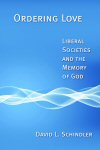
A metaphysical study of God, love, technology, and culture in modern society.
Reality most basically and properly considered, says David Schindler, is an order of love—a gift that finds its objective only in an entire way of life. In Ordering Love Schindler explores, in light of this understanding of reality, how modern culture marginalizes love, regarding it at best as a matter of piety or goodwill rather than as the very stuff that makes our lives and the things of the world real. Schindler examines how Western civilization's fixation with technology—especially its displacement of experience with experiment and its privileging of knowing and making—has undermined its capacity to build an authentic human culture. He shows, within the context of politics, economics, science, and cultural and professional life generally, that God-centered love is what gives things their deepest and most proper order and meaning, always and everywhere.
David L. Schindler is provost and dean of the Pontifical John Paul II Institute for Studies on Marriage and Family at the Catholic University of America in Washington, D.C. He is also the editor of Communio: International Catholic Review and the author of Heart of the World, Center of the Church.
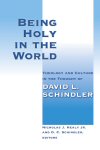
In Being Holy in the World Nicholas Healy and D.C. Schindler present the first book-length study of David L. Schindler’s thought, compiling essays by twelve scholars that examine Schindler’s Trinitarian theology, ecclesiology, anthropology, and metaphysics in the context of the encounter between Christianity and contemporary culture.
Contributors
- Stratford Caldecott
- Peter J. Casarella
- Larry S. Chapp
- David S. Crawford
- Michael Hanby
- Nicholas J. Healy Jr.
- Rodney A. Howsare
- D. Stephen Long
- Antonio López
- Tracey Rowland
- D.C. Schindler
- Adrian J. Walker
Seized by the beauty of reality, David Schindler is too alive in the depths of truth to look back and realize how groundbreaking his own explorations are. These essays by authors eminent in their own right excel at the challenging mission of showing exactly how far he has penetrated the two greatest questions: how do I relate to God, and how do I relate to other human beings? The result is ample proof for why David Schindler should be considered one of the most important theologians in the Church today. Being Holy in the World is a philosophical observatory: the revelation of how full, complex, ordered, and infinite the world is, can take one’s breath away.
—Carl A. Anderson, supreme knight, Knights of Columbus
This is a wonderful book, full of profound commentary on the thinking of David L. Schindler. . . Schindler is the most remarkable American theologian of all those who have explored the communio emphases on God as love and as Trinity. Among these, contributing to this book, are Schindler’s son, David C. Schindler, Adrian J. Walker, Michael Hanby, and Fr. Antonio López. Like Schindler himself, these scholars make important contributions to our understanding of the significance of communio theology for interpreting the Christian and American experience.
—Glenn Olsen, professor of history, University of Utah
Nicholas J. Healy Jr. is assistant professor of philosophy and culture at the John Paul II Institute for Studies on Marriage and Family, Catholic University of America, and author of The Eschatology of Hans Urs von Balthasar: Being as Communion.
D.C. Schindler is associate professor of philosophy at Villanova University. His books include Plato’s Critique of Impure Reason: On Truth and Goodness in the Republic.
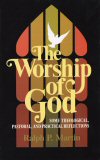
While most Christians today value worship and regard it as a vital part of the church’s life and witness, there is also a wistful yearning that contemporary worship be vastly improved and given a more satisfying rationale.
Calling his book a “compact guide to some of the main themes of the worship of God,” and believing that the agenda of worship “needs a serious overhaul in our churches,” well-known theologian Ralph P. Martin here reexamines the concept of worship, “recasting . . . its meaning in such a way as will express its essentially theological dimension and yet will relate its practice to the concerns, interests, and needs of men and women in our world.”
To that end, Martin discusses several elements of worship: praise, prayer, hymns, the offering, the creeds and confessions, the sermon, baptism, the Lord’s Supper, and the role of the Holy Spirit. The main thrust of Martin’s discussion it to consider, in the light of Scripture and history, the theological rationale for the practice of each element. A final chapter summarizes the author's definition of worship and diagrams a “service of worship” that involves all the aspects of worship he has discussed.
Both theologically adequate and pastorally helpful, the book is designed for ministers and theological students, as well as lay leaders in the churches.
Ralph P. Martin (1925–2013) was distinguished scholar in residence at Fuller Theological Seminary, Haggard School of Theology, Azusa Pacific University, and Logos Evangelical Seminary in El Monte, California. He wrote numerous studies and commentaries on the New Testament, including the Tyndale New Testament Commentary volume on Philippians and the volume on James in the Word Biblical Commentary series, for which he also served as New Testament editor.
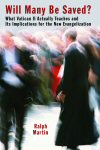
The question of whether and how people who have not had the chance to hear the gospel can be saved goes back to the beginnings of Christian reflection. It has also become a much-debated topic in current theology. In Will Many Be Saved? Ralph Martin focuses primarily on the history of debate and the development of responses to this question within the Roman Catholic Church, but much of Martin’s discussion is also relevant to the wider debate happening in many churches around the world.
In particular, Martin analyzes the Dogmatic Constitution on the Church, the document from the Second Vatican Council that directly relates to this question. Contrary to popular opinion, Martin argues that according to this text, the conditions under which people who have not heard the gospel can be saved are very often, in fact, not fulfilled, with strong implications for evangelization.
For many years we have all appreciated Dr. Martin’s considerable contributions to the mission of the Church. Now he gives us a profound doctrinal foundation for understanding and implementing the ‘new evangelization.’ This is a shot in the arm for bishops, priests, and laity as we respond to the Holy Father’s call.
—Timothy Cardinal Dolan, archbishop of New York
Dr. Ralph Martin’s Will Many Be Saved? contributes significantly to a richer understanding of our faith, helps restore confidence in the gospel message, and engenders a desire to share the truth of Christ’s message. An important contribution to the pastoral strategy of the ‘new evangelization.’
—Donald Cardinal Wuerl, archbishop of Washington, D.C.
Martin clarifies a doctrinal point that has been often obscured but must be recovered as a necessary foundation for the ‘new evangelization.’ This is a uniquely important book.
—Francis Cardinal George, archbishop of Chicago
Provides a refreshing reminder of the undiminished urgency and validity of the missionary mandate of Jesus to his followers to evangelize.
—Peter Cardinal Turkson, president, Pontifical Council for Peace and Justice
These penetrating reflections will compel us to reassess our pastoral approach to the preaching of the gospel in our present circumstances. An important book.
—J. Augustine Di Noia, OP, archbishop, Vatican City
Ralph Martin, STD, is the director of graduate theology programs in the new evangelization at Sacred Heart Seminary in Detroit, president of Renewal Ministries, and a consulter to the Pontifical Council for the New Evangelization.
This title is included in the following collections
You can save when you purchase this product as part of a collection.
Bible Reference Bundle 2.0
$4,512.95$3,599.99Logos 8 Ultimate Legacy Librar...
$21,749.99$21,749.99Eerdmans Ultimate Collection (...
$37,403.33$27,999.99